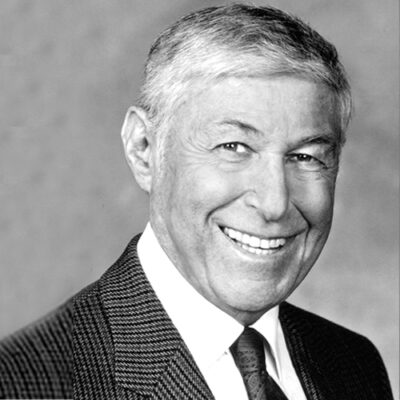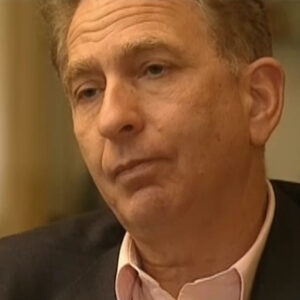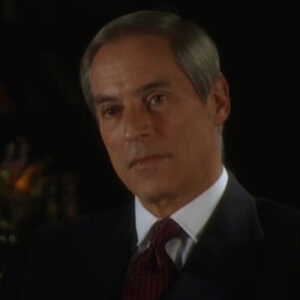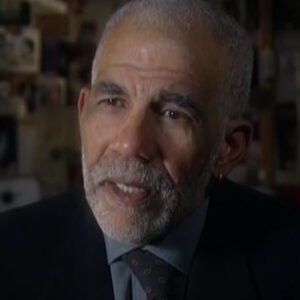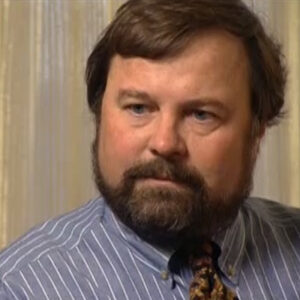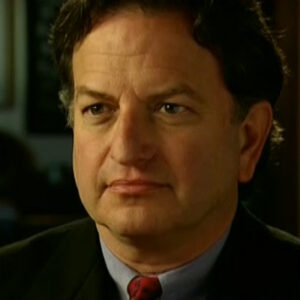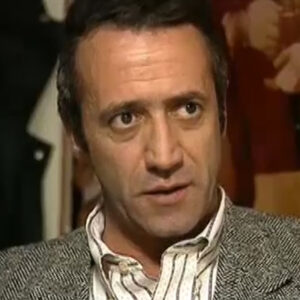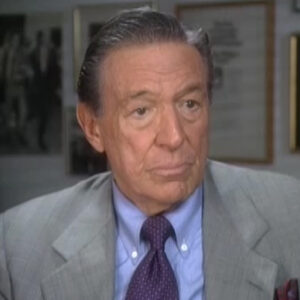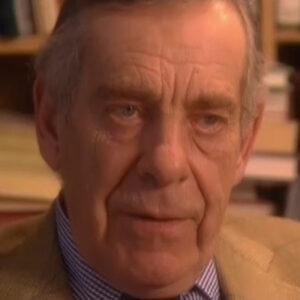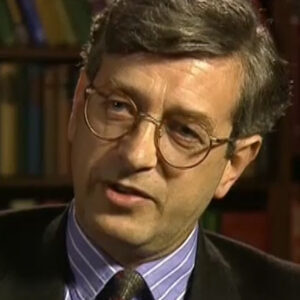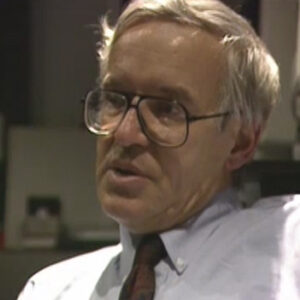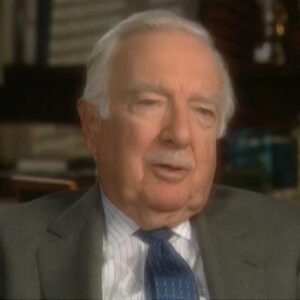Speaker She says, well, it all began with when FDA Commissioner Kessler issued a letter which really began the battle over tobacco. I mean, it began really with that letter which announced that he had evidence that the cigarette companies were intentionally manipulating the substance, this horrible substance, addictive substance called nicotine. And that got the debate rolling in a way that was very different than the debate had been proceeding before, which was that cigarettes were dangerous. Everybody knew cigarettes were dangerous, but no one had ever looked at the manufacturing process. And that is what was new. When did that come to your attention and just put into a time and time context for. Well, when I went to ABC News, we had word that there was let me start again also. Are we talking about January 95 five? What? Oh, no, no. This was 90, let’s say I believe 90, 92. OK, that’s what I’d like to say. It was as early as it was as early as nineteen ninety two when I came to ABC News, when I had heard reports from Reliable Sources that there was evidence out there to be had of nicotine manipulation by the cigarette companies that had not been reported anywhere. It was not part of the national debate at all. There had never been any effort really to look at the manufacturing process of cigarettes. And I decided to do that and began a long investigation of it, which first resulted in a story about nicotine and the horrors that it had visited upon the workers in the fields who happened to rub up against it and harvesting tobacco plants so they get sick. We chronicled that. And then the next logical piece really was to show if this substance is so horrible as we as we showed in the piece and the piece for ABC News, you know, why on earth are the cigarette companies manipulating this substance in a way that people felt was designed to addict people and everyone until this point thought that nicotine was just the natural byproduct of making cigarettes. And we were able to show at ABC News that that wasn’t the case, that it was there in many cases intentionally. And that’s what and that’s what David Kessler, the FDA commissioner, also showed. And at that point, the debate really began.
Speaker Well, what’s interesting then is when we saw the frontline piece of smoke in your eyes, smoke in the eyes, excuse me, you were basically ambushed on the street by the front line reporters to ask you about the story. Do you remember this? Oh, yeah. Tell me for half of it. And you didn’t talk?
Speaker Well, I was working at ABC News. I thought it would be bad form to be knocking your boss, the people who paid you out while you were in their employ. And I just didn’t think it was right. And so I didn’t do it. That doesn’t mean that they didn’t deserve heaps of criticism for how they behaved through the whole early stages of the tobacco debate and all the reporting that went on. They subsequently did a fine job of covering various issues, but in the early days, they were very timid about it, very nervous.
Speaker How did you feel when ABC, your network at the time, apologized on the air, on the nightly news?
Speaker It was it was wrong. It was a false apology. There was no basis to it. And time has shown that to be the case. My lawyers didn’t feel that there should be any apology. There had been a mock jury trials of it where evidence was presented to to mock juries in tobacco country and they came in overwhelmingly in favor of ABC News. We weren’t going to lose that lawsuit. They knew that. I think there were other things at stake here. I really haven’t had the time to explore it. All I know is that the apology didn’t have anything to do with the facts of the case.
Speaker Well, it seems like the apology clearly had to do with the same thing you had with CBS. I mean, the merger is taking place, Disney coming in money.
Speaker People made a lot of money off that merger. The apology happened at about the same time as the merger. A new company buying another company. You’ve got a ten billion dollar lawsuit on the books, something I would imagine that they would want to clear up. Again, I’m not privy to that. The inside discussions, all I can do is keep repeating that, that the people who worked on the story didn’t support the apology, the facts didn’t support the apology. And so I can only give. Clue that something else was at stake here was going on and it didn’t have to do with the facts.
Speaker How did you feel that day as the reporter who had done this story? How did you feel?
Speaker I didn’t feel very good. I mean, how would anybody feel in a situation like that? I felt good. And knowing that that that we had contributed to one of the more significant stories of this era that we had, along with Dr. David Kessler of the FDA, started a debate which to this day is is changing how cigarettes are made and marketed not only in this country, but probably in the world. It was an important story. I knew it at the time and I took comfort in knowing that they could never take that away. And so, you know, the truth will eventually emerge.
Speaker You said in an earlier interview that you and I did that you came to 60 Minutes because and I quote, you saw it as a place that that you could practice your profession beyond the reach of outside control. How, then, did you feel when they refused to air the Jeffrey Weigand story under the right set of circumstances?
Speaker Any news organization will cave. I wasn’t here at the time, so I don’t know all that went into it. All I know is that we’re a flawed institution, just like every institution in this country, and we have our good days and bad days. That was a very bad day for CBS News. It was a very bad day for ABC News when they did what they did. And I think if they were to be candid with you privately, they’re very embarrassed about what they did. Those things happen. We can’t be defeated by those. We have to move on. You have to take your licks if you’re going to be doing important stories. You know, life does not always end with a happy fairy tale ending. It didn’t end tobacco, although maybe ultimately it will. Who knows?
Speaker What is the implication of this situation for broadcast journalism?
Speaker Well, it was a sobering moment. And I don’t I’m not sure what the long term effect will be. I think that there has been a change to a certain degree in the kinds of stories that some news magazines will go after. I mean, you look at the news magazine landscape today, there’s not a whole lot of serious investigative work going on. Oh, they’ll do the same. Trot out the same old villains. They’ll go look at dirty restaurants and in stories or used car dealers. But I think with some significant exceptions, very serious investigative stuff is sort of hard to find. And I thought that 60 Minutes would be one place where they would encourage it and welcome it if it came along. And and I still feel that way.
Speaker It seems that the scuttlebutt around, I should say, talking to to journalists, are that the issue facing journalism today is with the growth of these big multi national corporations that now own a great deal of the media. It is going to be harder and harder to do stories about people the same size as the networks. I mean, it’s the best way of saying it.
Speaker What is your sort of thought about that with the news media consolidating and becoming parts of big corporations even bigger than they were before? Yeah, it worries me. Bad things can happen. I’m hoping that they don’t. Am I worried? Yes, I’m worried. So far, it hasn’t affected me. On a personal level. I’ve been able to do any stories that I’ve proposed here. They’ve been encouraged. I think if I were to tackle a very important story, 60 Minutes would let me do it. In fact, they would want me to do it. Sure, there’d be nervousness. There should be nervousness over over stories that could end up costing you money in defending in court. I mean, that’s part of it. But that goes with the turf. Could it eventually change? Yes, I’m worried about it. We all should be worried. We all should be vigilant. So far, it hasn’t affected me. I’m hopeful it won’t.
Speaker I guess I was going to ask you if their stories of you can’t do, but I I guess you have your answer. Are there stories you can’t do?
Speaker I don’t know.
Speaker Truthfully, no, no, no, I’m not going to get in yet, OK, smart move. But yeah, I mean, you know, I’m just not going there certain, you know.
Speaker Well, so far I’m able to do any story that I felt that I wanted to do. And I and I see no reason to think that that’ll change.
Speaker Don Hewitt didn’t support Lowell Bergman in doing this story. He’s your new boss, right? You ever discussed it with him?
Speaker No, I haven’t. Again, I wasn’t here at the time that CBS had its problems. I don’t know all that went into that decision. I happen to think that if if Don Hewitt had a chance to play that one over, put it on, rewind and play it again, he’d change how it how it was handled. Like I said, everybody has a bad day. He’s been doing this thing for 30 years. I mean, he’s entitled to a bad day. We all wish we didn’t have days like that, particularly on stories as important as that. But, you know, it happened and he and we were able to move on from it.
Speaker What is Don’s relationship with the producer? You’re a fairly new producer here, but what is your relationship with Don?
Speaker We I don’t know. I don’t know how to how to define that. I know that he he’s excited. And as a producer, that’s a lot that means a lot to us because he runs up and down and talks about stories and he’s excited when we talk about stories with him. And he tells me about every story that’s working and going on, you know, across the the office, whether I want to know about it or not, that’s OK. You know, he’s excited and and I think it’s infectious and we pick up on it and he’s the boss. I mean, I don’t you know, you ask what our relationship is. I mean, you know, there’s there’s never a moment. And in my time here nor ever a moment when when I, you know, as long as I’m here, that I’ll think that, you know, Don Hewitt doesn’t like it or takes a position one way that I’ll ever be able to convince him that he’s wrong. I think Mike Wallace can, but I don’t I’m not sure if I’d ever be able to or most of the things filtered.
Speaker I mean, it seems that that the hierarchy here is the following. And you could tell me if I’m wrong, there’s Don. And then there are the correspondents and then the correspondents have their producers. And it seems like that that that that’s that there’s a filter between the correspondent, between the producers and down through the correspondents. Is that is that about right?
Speaker Yes. Yeah. I mean, when you got hired here, did you get interviewed by Don Hewitt?
Speaker Yeah, he called me up and would say I called, call me up and told me a bunch of lies, like, you know, I says, oh, the reason that this show was such a success is because I hire smarter people than I am like you. I oh, come on. You know, you think I believe. Oh, no, it’s true. So that’s why we’re good. People like you are a lot smarter than I am.
Speaker I said, okay, you made your point. Yeah. Yeah. I’d like to come to work for you. And and he says, you know, I would really like to have you and Mike really wants to have you. So come on. And at that time, you know, I was ABC wanted to keep me. I was considering going to NBC and I just thought that you had an opportunity to work with these legends here. You know, who knows how long they’re going to be around or how long I’ll be around. So let’s take advantage of it. So that’s why I came here. I haven’t been disappointed yet. Good.
Speaker Do you think we missed anything about seatback?
Speaker Well, just, you know, the Brown and Williams. Oh, yeah. That’s that’s well, but I look, I don’t need to go in there with LOL, so I’d like you to I’d like you would help me for you to go there with it.
Speaker OK, well one of my biggest disappointments over over at ABC really was when we had what the FDA commissioner has called the most historic documents ever in history, the internal Brown and Williamson Records. We were the first people to have them over at ABC. We wanted to put them on the air because immediately we recognized the historical significance of them and how much they would advance the debate on on on cigarettes. And unfortunately, when we had them and tried to to make preparations to get them on the air, the lawyers at ABC News decided that this was not a gamble that they wanted to take.
Speaker They decided that the news in this case was going to take a backseat to playing it safe. And they decided not only not to block the story, but to seize the documents from us. And that’s exactly what they did, came into our office, ask for all the copies, took them and said, well, there’s a court injunction out there. We can’t do these stories. We could be in trouble with the court. Our CEO could go to jail. We could be fined countless hundreds of thousands of dollars daily, but in fact, a little yellow.
Speaker Hi, Mr. Wallace, how are you? I’m doing fine, how is the flight over? You know, you arrive good.
Speaker How I know him, I know him, he did he did a piece about my book for ABC News. That’s how I got into television. Yeah, well, he just he was at work for 20/20 and he came over and interviewed me and did a piece on the book. Right.
Speaker Oh, that’s bullshit. I didn’t want to workwear with you for what?
Speaker That’s not that’s not that’s ridiculous. I never said any such thing. Well, that’s not true, Mike. I wouldn’t be here if that was true. Yeah. I’ve seen him one time since I’ve been over here, and that was that was sort of a consolation dinner with him when I, you know, after that lawsuit that he had a problem with. And we talked, you know. OK.
Speaker I know nothing about any of that. No, I didn’t I really didn’t see much of them when I was at ABC either. I mean, he always struck me as a nice fellow.
Speaker The times I’ve dealt with them, you know, that’s all. But. All righty.
Speaker Life follows you around. Yeah, I need you to put this into account. I need you to. Are we OK? We’re OK. We’re all right. And you have to put into a time context. When does this you’re receiving the Brown Williamson papers.
Speaker How does that relate to when Lowell Bergman received the papers on his doorstep? I mean, is this about the same time?
Speaker I don’t know what papers he’s talking about. I have no idea what he went to these papers. I think the papers he’s talking about are cigarette fire safety cigarettes. That’s the piece he did for 60 Minutes. We’re talking about totally different, something totally different.
Speaker You talked about the papers we’re talking about when Kessler referred to is the most historic documents ever to come out on tobacco. We were the first news organization to get them.
Speaker And when you did your pieces.
Speaker Right? Well, we tried today one. We didn’t have them back then. These came out long. And this came out after actually after the lawsuit was filed.
Speaker And and the debate was hot and heavy nationally. And these documents supported allegations that the cigarette company knew a lot more than they were they were letting on.
Speaker And were these documents in your possession before the Weigand story aired? Oh, yes. Oh, yeah. Yeah, absolutely.
Speaker And in fact, when our lawyers came through and told us that there’s no no news organization anywhere that’ll that’ll publish these documents, The New York Times came out a month later and in fact, put it on the front page and did a three part series. And they quoted their lawyer. Their lawyer was quoted in the article saying, well, this this is unconstitutional. And in fact, the reporter of The New York Times constitutional, this court injunction that was that our lawyers at ABC cited as the reason for why they didn’t want to go forward with this story. The New York Times looked at that same court injunction, found it ludicrous on its face, published it and subsequently had no problems with it. And in fact, I talked to the reporter at The New York Times about it. He said, oh, our lawyers laughed about that. They knew that that wasn’t a problem. And they published it. And Kessler then went on to to to use those and cite those records as the most significant documents and in the entire effort to come forward. And this was somewhere around the summer of ninety five. No, this was in the spring.
Speaker The spring shortly after you put your programs on.
Speaker No, no it was. Let’s see.
Speaker It was in the spring, a couple of months later, I guess three or four months later.
Speaker So The New York Times Legal Department didn’t have any of the problems that either ABC or CBS had with this story. It seems that way. And The New York Times had no problem with it.
Speaker I mean, they put the piece on the air. I mean, they put the piece on the front page it, and then it was picked up. Articles were written. Kessler testified about a lot of those documents. I forget one lolls piece came up, but I think it was much later.
Speaker Well, it was supposed to air a censored version of it aired November 95. The final version aired not till January ninety six.
Speaker Well, Jeffrey Wigand put flesh on the bones of this story. These were just records. These were barebone records that told the story. But but Jeffrey Wigand was extraordinarily significant in that in that he he explained them and he told it from an insider’s perspective. But the documents themselves came up much earlier, came out in the spring, and and we wanted to be the news organization to break them. And we tried to and ABC wouldn’t let us. So we had to give that honor to The New York Times.
Speaker Lowell said this was the first time and won’t make much longer. But I think that you want to know this anyway. Lowell said that in the 13 years that he had worked as a producer at 60 Minutes, this was the first time that the legal department, no one ever called him over to Blakroc. The call them over, not when the program had finished, which he had been involved in situations where there had been lawsuits, but never during the process of gathering information.
Speaker Well, that doesn’t surprise me because we were trying to publish the Brown Williamson papers when our legal staff came into the picture and they not only blocked the story and they not only summoned us, they took our documents physically sees them.
Speaker I use the word seize because that’s what it felt like.
Speaker I felt like I was in a third world country. I have the most historic tobacco documents ever in my hands. I wanted to share them with the public. That’s what a journalist is supposed to do. That’s what I worked so hard to put myself into position so that I could break that kind of story because it’s important story. And for the debate, we tried to do that and ABC would have none of it. They not only blocked it, they seized the documents.
Speaker And we had to give that honor, regrettably, to The New York Times, which had a bit more courage than we did Lesley.
Speaker Did you have a confidentiality agreement with ABC News at the time?
Speaker The time of what the whole time you were employed there as a producer? No.
Speaker Do you have a confidential what do you mean by. I’m sorry. I don’t know what that means in terms of what not being able to talk about certain kinds of things. Now, only when the lawsuit was filed was there a gag order put on it. But before I could do it, I think they wanted us to get approval, you know, before we spoke. And actually, there was a there was a rule at ABC that you’re supposed to get approval to speak, but there wasn’t a gag order per say once the litigation began. They use that, I think, effectively to muzzle a lot of the people who were very unsatisfied with how our handling of this lawsuit was going.
Speaker Do you have a confidentiality agreement with CBS? I don’t think so. I mean, no, I don’t think it’s any different, really, than ABC. Have you dealt with a lot of sources of potential stories where they have had confidentiality agreements? Yeah, I promise confidentiality when it’s appropriate to to to source. No, you’re not you’re not following them. I’m saying the case with Jeffrey, why there was the fact that there was this thing called tortious interference. Right. What tortious interference was about was the fact that he had a confidentiality agreement with Brown Williamson. Oh, that’s a different one. Yeah. He had a confidentiality agreement by Mosher and CBS News trying to talk to them. No, I’ve never I’ve never run into that, OK?
Speaker I can’t think I have anything else to to ask, I think I’ve kind of done it. OK, so anything else that you think’s important, though? OK, I should do the risks and.

